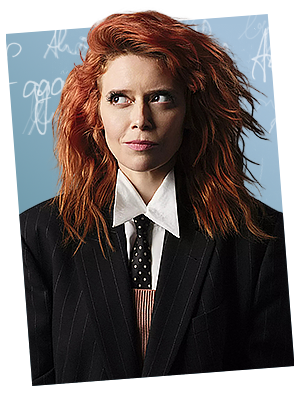
“You know Emily’s capable of doing something fucked up,” Aubrey Plaza declares with a mischievous smile. “She’s gone through some shit. But you don’t know what her past is.” Plaza, 38, is enthusing – albeit in her trademark deadpan voice – about Emily the Criminal, a nail-biting thriller that’s a massive departure from her comic roots. Although Plaza gained fame for playing funny people in Parks & Recreation and, well, Funny People, she’s since reinvented herself as one of the sharpest dramatic performers working today. Last year, there were the hallucinatory gear shifts and eye-popping freakouts of Black Bear; now, Aubrey the actor is Emily the criminal.
Written and directed by John Patton Ford, Emily the Criminal stars Plaza as a temp worker with $70,000 of student debt and a felony limiting her career options. Emily’s solution is to be a “dummy shopper”: Youcef (Theo Rossi) gives Emily a fake credit card, she purchases a store item on his behalf, and then she receives cash in hand. When a grift inevitably goes wrong, Emily resorts to violence. “The role was a physical challenge,” Plaza explains. “I worked with a dialect coach. It was a big deal because I’ve never worked like that before.” Emily is, in fact, from Jersey. “I watched a bunch of De Niro movies, did an impression of him, but said the lines in the movie.”
My interview with Plaza is during the London Film Festival, in Soho, less than an hour before her sold-out, career-spanning talk at a nearby cinema. In terms of arthouse features, Plaza’s playfulness slots in seamlessly with the esoteric humour of Whit Stillman and Hal Hartley; elsewhere, she can achieve big laughs, whether it’s in Dirty Grandpa, Scott Pilgrim, or 125 episodes as April Ludgate in Parks & Recreation. Often there’s a pathos behind the droll delivery, especially as Plaza’s characters maintain the demeanour of someone you know in real life – if not you, yourself.
At 20, Plaza suffered an anxiety-related stroke. How much is Emily driven by financial necessity, versus personal issues? “It’s not just that she needs money,” Plaza says, “but she’s drawn to questionable situations. She’s fighting a lot of demons.” What was her way into the character? “The idea of feeling out of place, misunderstood, frustrated, grinding it out, and being treated a certain way. I understood that part of it. Obviously not to the extremes that Emily is experiencing. I haven’t committed credit card fraud.” A comic pause. “Yet.”
Ford had the same catering job as Emily and graduated from film school with $93,000 in debt. “John wrote the movie years ago, pre-pandemic, pre-Trump. But clearly, in America, things are still the same. There’s an entire generation who are frustrated and trying to navigate a broken system.” Plaza acknowledges that the film doubles as a DIY guide for fraud. “I know how to work the embossing machine now, so I can make fake credit cards when I want. You can buy them on eBay. It’s not hard.”
Has she heard from scammers who say “I feel seen” in response to the depiction of a mentally taxing occupation? “I haven’t personally. But I know that people feel seen by the movie in many ways, and I’m sure that credit card fraud people are having their day in the sun.” I note that if fraudsters contact her to praise the movie, it’s safer not to reply. “I know, that could be part of the scam. Scammers just can’t stop scamming.”
I bring up the fact that Jeremy Renner, who’s on Marvel money, still flips houses. Does Plaza think Emily derives pleasure from her moneymaking methods? “I think there’s something exhilarating about scamming and getting away with it. The movie is a character study of someone who’s turned on by that stuff. It’s an addiction… ultimately she wants to be a criminal, because that’s who she is.” Hence the title? “Exactly.”
Throughout Emily the Criminal, the camera remains close to Plaza, capturing the angles of her anguished face as she outcons conmen, survives a car chase, and is shoved onto the floor with a knife placed against her neck. “If you’re dealing with that much money, Los Angeles can be a scary place,” Plaza says. “If you start stealing cars, there are bigger consequences.” When I joke that that’s why in LA, the land of anti-piracy adverts, they say you wouldn’t steal a car, she shoots back an April Ludgate-style look of disapproval – it’s very exciting. More on point, the indie caper possesses a gritty, in-your-face quality, albeit due to a tight 21-day schedule.
“The movie definitely needed more time and money,” Plaza says. “But that energy was infused onto the screen. Sometimes you see Netflix movies or whatever with bloated budgets, and they have all the time and money in the world, and those movies are boring because everyone’s comfortable, and you can’t put your finger on it, but there’s something off about it. Sometimes movies don’t need to be made that way. That’s the magic of independent films. There’s an energy to it. We did it down-and-dirty style.”
I recall that when I spoke to Plaza for Black Bear, she mentioned writing a four-quadrant movie that she plans to direct. Will she throw away her budget and shoot it in 21 days? “No, I need more than that! I take it all back! I want more days and more money!” She adds, “I’m getting close to it. I’ll take whatever days. As long as I can do it my way.”
As Emily briefly speaks Spanish, would Plaza ever do a film entirely in that language, especially if it was directed by, for instance, Pedro Almodóvar? “I want to work with Pedro Almodóvar more than anything,” Plaza says. “Tie Me Up! Tie Me Down! is my favourite, but I love all his movies.” I tell her that Almodóvar dropped out of Cate Blanchett’s A Manual for Cleaning Women because he felt uncomfortable directing in English. “I need to be better at Spanish. I need to call my grandmother to learn more. Give me one week. I’ll be fluent for you, Almodóvar!”
With a few minutes left, I ask Plaza for a scoop. In our previous interview, I challenged her to say something that would be picked up by IndieWire. She described a disastrous audition for Deadpool 2 and made a plea to Hong Sang-soo – it didn’t work. This time, she suggests I pick the subject matter. I bring up John Waters’ recently announced Liarmouth, his first film since 2007. Before I can finish the sentence, Plaza interjects, “I emailed him immediately, and said, ‘You better let me audition for you. I even look like the girl on the cover [of the book he’s adapting].’” So she’s auditioning for the lead? “I exclusively only audition for John Waters. He told me I’m on his list, but I want to be top of the list. I want to be the only person on his list. They’ve told me I’m this generation’s Kathleen Turner. I mean, come on – I’m a shoo-in. I need that movie.”
As my interview time is up, I ask Plaza if she can rephrase her desire to work with Almodóvar, as I’ve pinpointed that as the juicy quote to be extracted from the article. “I’d go with the John Waters thing,” Plaza says. “I’m throwing myself at his feet. I’ll do anything to get the part. And I mean anything.” Should I put the “anything” in italics? She nods. “And I mean anything.”
Source: Dazed


































